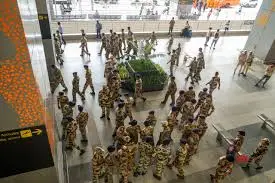Operation Sindoor: Security level at all Indian airports raised, additional pre-boarding security checks for all passengers ordered

New Delhi, May 9, 2025 — India has launched Operation Sindoor, a major security initiative that increases protection at all airports nationwide. The Ministry of Civil Aviation, along with the CISF and BCAS, has implemented tighter safety rules and extra checks for passengers across domestic and international terminals.
This move comes after fresh intelligence suggested possible threats to India’s aviation network. Although officials haven’t revealed the exact nature of the threat, they’ve acted quickly to avoid any potential security lapses.
Airports Now Under Level 2 Alert
Under Operation Sindoor, all airports are now operating at Level 2 alert, which is one step below the highest level. The new security measures include:
- Multiple security checks at terminal entry points
- More thorough baggage screening and random checks at gates
- No entry for visitors inside terminals
- More sniffer dogs and bomb squads on site
- AI-based surveillance using facial recognition and behavioral tracking
Passengers must now arrive at airports 3 to 4 hours before departure, regardless of flight type.
Aviation Minister Asks for Public Support
Civil Aviation Minister Jyotiraditya Scindia has urged passengers to stay calm and follow all guidelines. “These are preventive steps for your safety. Please cooperate with the security teams,” he said.
He added that flight operations would continue normally, though with extra precautions.
Why Operation Sindoor Was Launched
Agencies like the Intelligence Bureau and RAW picked up suspicious activity through encrypted channels. Although they didn’t find specific targets, the pattern of activity raised alarms. Security agencies recommended immediate steps to protect the country’s aviation sector.
A senior intelligence official said, “We spotted increased online chatter from certain extremist groups. This operation is a way to stop threats before they become real.”
Travelers Face Delays but Understand the Need
Many passengers faced longer queues and delays, especially at airports in metro cities like Delhi, Mumbai, Bengaluru, and Kolkata. Airlines have updated their schedules and asked staff to handle longer check-in times.
Airlines like IndiGo and Air India have also advised passengers to carry less cabin baggage and reach airports early.
“I waited longer at security today, but I feel more confident about flying now,” said Pooja Nair, a traveler flying from Mumbai to Chennai.
Global Aviation Bodies Show Support
International organizations such as the ICAO and IATA welcomed India’s decision. ICAO issued a statement supporting the country’s focus on aviation safety and its alignment with global practices.
Meanwhile, countries like the U.S., UK, and Australia updated travel advisories, urging their citizens to follow new security rules when flying through Indian airports.
Airport Officials Ready with Emergency Plans
The Airports Authority of India and private airport operators like GMR and MIAL are working closely with state police and intelligence services. They’ve launched mock drills and increased emergency staff across terminals.
“We’re managing the higher load while making sure passenger safety stays a top priority,” said a senior official at Delhi airport.
Experts Praise the Strategy
Security professionals have supported the move. Group Captain Rakesh Singh (Retd.), an aviation analyst, said, “This is smart and timely action. Global trends show that civil aviation remains a key target. India is sending a strong message by acting before an incident occurs.”
He also noted that the operation improves coordination between multiple agencies and highlights gaps that need fixing.
Final Thoughts
Operation Sindoor shows India’s commitment to aviation safety. In a world facing constant security threats, such steps offer peace of mind to travelers. The extra checks may slow things down, but the priority is clear—keeping passengers safe.
As the operation continues, authorities will adjust strategies based on real-time intelligence and public feedback.






